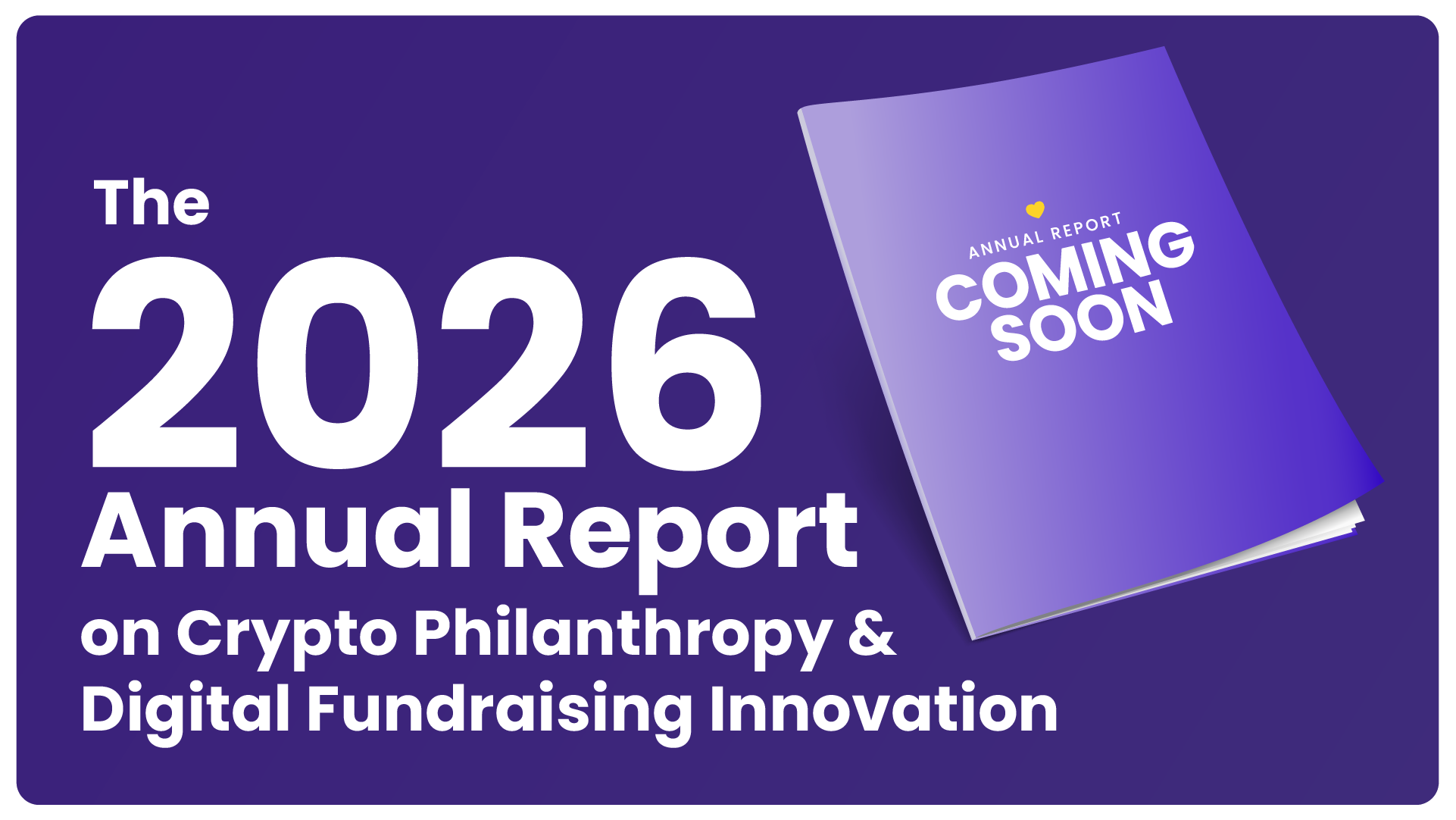The year-end giving season is the most lucrative time of year for nonprofits. From Giving Tuesday through December 31, donors go above and beyond to support the organizations, causes, and missions most important to them. Check out these stats, drawn from recent research by NextAfter:
- Giving Tuesday brings in 4.3% of all year-end giving revenue
- December 31 brings in 15.5% of all year-end giving revenue
- The last week of the year nets 37% of all online year-end giving revenue
As a nonprofit, you want to ensure you don’t restrict any of the ways in which your donors can support you. If you aren’t able to meet them on their turf, so to speak, they’ll find another organization that does.
This is especially important when thinking through your approach to fundraising Bitcoin and other cryptocurrencies. Not only can accepting Bitcoin donations attract new supporters to your cause, it can also open up new pathways for existing donors to double down and give more to your organization than they already have.
Below, we’ll walk through why Bitcoin is currently the most popular among cryptocurrencies and the fundraising opportunities it presents for your nonprofit. Then, we’ll show you how to nail your ask for Bitcoin donations during the year-end giving season, and beyond.
Bitcoin is King (For Now, at Least)
Since it first launched in January 2009, Bitcoin has become the most popular cryptocurrency with a market cap of $887.7 billion. Today, Bitcoin is praised as the best performing asset of the last decade—it’s cumulative gains of 20,000,000% have blown away that of the Nasdaq 100 (282%) and US Large Caps (541%).
The decentralized nature of Bitcoin means it’s not restricted to the borders of America, or anywhere else for that matter. It has gained major momentum internationally, most notably in El Salvador, where President Bukele has made Bitcoin legal tender and recently announced plans to create an entire city around Bitcoin called (what else) Bitcoin City.
Bitcoin City will be funded by $1 billion Bitcoin bonds and seek to implement Bitcoin as the country’s main currency. From residential areas and shopping centers to restaurants and global ports, everything will operate around Bitcoin. Everything.
Bitcoin may have started as a niche investment opportunity that not many people understood, but it’s become an integral part of society that’s radically changed the face of finance, and the world at large, forever. It’s not a fad. It’s not going away. It’s only going to get bigger.
The Opportunity for Your Nonprofit
CNBC recently surveyed a group of millionaires, all of whom are Millennials, and found that 83% own crypto. Often, these Millennial millionaires have large amounts of Bitcoin in their portfolios, and they’ve likely incurred major capital gains they want to offset on their taxes with charitable crypto donations.
Most importantly, Millennials are a highly active demographic for charitable giving:
- 40% of Millennial donors are enrolled in a monthly giving program
- 46% donate to crowdfunding campaigns
- 11% of total U.S. giving comes from Millennials
- 84% of Millennials give to charity, donating an annual average of $481 across 3.3 organizations
It’s highly probable that Gen Z will also follow the crypto trail blazed by Millennials as they continue to enter the workforce and move into positions of power. And they’re equally viable donors, as 32% donate their own money.
While younger generations like Millennials and Gen Z are the most fervent crypto investors, you shouldn’t ignore the older generations either. One-fourth of Gen X owns crypto and 4% of Boomers own digital assets. As people of all generations get more crypto, they’ll undoubtedly want to donate it.
As we make our way through the 2021 year-end giving season, your nonprofit needs to ask for Bitcoin donations. But it’s crucial you also make Bitcoin donations a part of your overall fundraising strategy year-round, for 2022 and beyond.
How to Ask for Bitcoin Donations Effectively
On #CryptoGivingTuesday, The Giving Block processed $2.4 million in total crypto donations with an average gift size of $12,600. Of that total, Bitcoin donations alone totaled $885,504.55.
As we look towards the close of the year-end giving season and our #BagSeason crypto fundraising campaign, we fully anticipate even bigger numbers. Below, we’ll walk you through some strategies to help tailor an ask for Bitcoin donations and ensure your nonprofit gets a sizable piece of the pie.
1. Make an Official Crypto Announcement
Whether you’re already set up to accept crypto donations or you’re just getting started, it’s crucial that you let your audience know it’s an option for them to give. The best place to start is with emails to your donor base.
Consider sending personalized email announcements and appeals to your different segments within your overall database. For example, you might target high net worth individuals highlighting the tax benefits of crypto donations, or you could message your most loyal donors and showcase a new way to show their commitment to your cause with crypto.
You should also post on your Facebook, Twitter, Instagram, and LinkedIn channels. Your supporters can re-share these messages to their networks and introduce your organization to new potential crypto donors.
Plus, having an active social media presence will ensure you capture any organic mentions of crypto donations made to your organization. If someone donates and then shares on social, it’s a way of giving you full permission to publicly shine a spotlight on their generosity.
Make a bold, loud announcement because you never know who prefers to donate crypto over cash, just like the University of Arizona Foundation discovered. And the year-end giving season is the perfect opportunity to unveil your exciting new giving channel.
2. Talk About Tax Savings as Much as Possible
Despite the growing number of crypto investors, many remain unaware that it’s possible to save big on their taxes with crypto donations made directly to your nonprofit. Emphasize that Bitcoin and other cryptocurrencies are treated as assets and subject to capital gains tax.
However, also make it crystal clear that crypto donations are never subject to capital gains tax rates. Donors can write off the fair market value of the crypto asset on your taxes after making a crypto donation, depending on how long they’ve held it.
If it’s been one year or less, donors can deduct the lesser of their crypto basis or its fair market value up to 50% of their annual gross income. If it’s been over a year, they can deduct its fair market value up to 50% of their annual gross income.
But it’s crucial that they take advantage of the year-end giving season in order to realize these tax benefits for 2021. Consider following your initial announcement about crypto donations with a piece that’s all about the tax benefits and how to get them.
`Our team at The Giving Block has compiled a large library of tax-related content your nonprofit can use to help shape your messages.
3. Use SEO for Your Crypto Donation Page
One of the best parts of year-end giving is the exposure to new audiences for your nonprofit and the potential to acquire new donors. Accepting crypto donations is a massive step toward realizing that goal.
If you want to take it even further, optimize your donation page for search. Also known as search engine optimization (SEO), this can help your page show up in search engine result pages (SERPs).
It’s a huge driver of organic traffic and ensures people who want to find you can easily do so. Even if you’re still learning about the world of crypto and figuring out how to ask for Bitcoin donations, you should implement SEO best practices on your page.
Perform Keyword Research
There are plenty of free and paid tools available, like Google Search Console, SEMRush, or Ahrefs that can help you here. The end-goal is to discover what terms people are searching around crypto donations and your specific nonprofit.
If you’re an animal-focused nonprofit, some of your keywords or keyword phrases may look like:
- Support animal nonprofits with crypto
- Animal charity crypto donations
- Year-end crypto donations animal nonprofit
Use Your Keywords
After you’ve got a good grouping of relevant keywords, you have to include them in your donation page. The key here is to use them in ways that make them feel conversational. If you force them into the page, search engine algorithms will be able to tell and actually de-prioritize your page.
One of the best places to insert keywords is subheadings, parts of the page that are large and bolded. A well optimized page should allow someone to scan only the subheadings and understand the whole message.
Create a Title Tag and Meta Description
Whenever you search for something, the SERPs display a special title tag and meta description for the content you’re viewing. These fields are written by SEO specialists to highlight the key message of the content you’re about to click into.
It’s crucial to always fill these out and organically insert your keyword or keyword phrase in both. If you don’t, the search engine will automatically crawl your page and auto-fill information it thinks is relevant. This can lead to major misunderstandings in SERPs if it picks the wrong information to fill.
Here are a few examples of nonprofit donation pages that are SEO optimized and easy to read:
4. Prioritize Collaboration Over Competition
One of the best things about the social sector is that it’s built on the foundational precept of collaboration. Instead of fighting other nonprofits with similar missions, we often see powerhouse partnerships form and larger-than-life goals accomplished, together.
Crypto philanthropy is still very new, but as the culture continues to form, we see many collaborative tendencies emerging here as well. When nonprofits fundraise crypto together, they’re bringing better visibility to everyone’s efforts.
Not only does that help increase overall donations, it also establishes crypto philanthropy as a trustworthy, credible, and effective means of making an impact. During the year-end giving season, or any other time of year, consider partnering with likeminded nonprofits on fundraising campaigns.
The Giving Block works hard to cultivate this sense of collaboration across the social sector with campaigns like #CryptoGivingTuesday, which saw over $2.4 million worth of crypto donations. Our end-of-year #BagSeason fundraising campaign is another collaborative effort that seeks to raise $100,000,000 in crypto for participating nonprofits.
Regardless of your collaborative efforts, be sure to blast them all over social media with designated hashtags, specifically on Twitter. This is where the majority of crypto enthusiasts talk with one another, and all it takes is a few retweets from big players for your campaign to go viral.
5. Showcase the Impact of Crypto Donations
Whenever someone makes a donation to your nonprofits, it’s crucial that you show them the specific, measurable, and tangible impact their gift makes. This is just as true for crypto donations as it is for normal cash contributions.
But since crypto philanthropy is still young, it’s more important than ever to clearly showcase the impact of a crypto donation of any size. Always seek to show how your nonprofit can advance its mission and work because of that singular donation.
You can also use impact showcases on the donation page itself to encourage crypto donations. For example, if you’re an education nonprofit you could say that:
- 2 Bitcoin will cover the cost to build a new school
- 5 ETH will provide brand new books for all students in one grade level
- 1 ETH will keep the cafeteria sanitized all year
- Any amount of Shiba Inu or Dogecoin will go towards school supplies for the kids, like pencils and markers
Do anything you can to make impact tangible for your crypto donors. It will encourage them to share among their networks, and it will bring them back again for future donations.
The Time Is Now: Ask for Bitcoin Donations
The year-end giving season brings a heartfelt spirit of generosity, tremendous amounts of hype, and a sense of urgency as donors look to give before the year is over. Given the traction around cryptocurrency, it’s the perfect time to ask for Bitcoin donations.
Even after we enter 2022, the value in having a way to accept crypto donations will only increase. It offers a new, exciting way for donors to support your work and opens you up to massive potential new audiences.
If you’re having FOMO around crypto donations, don’t worry. It’s never too late to get set up, and our team would be more than happy to help you tap into the power of crypto as a force for good today.

























